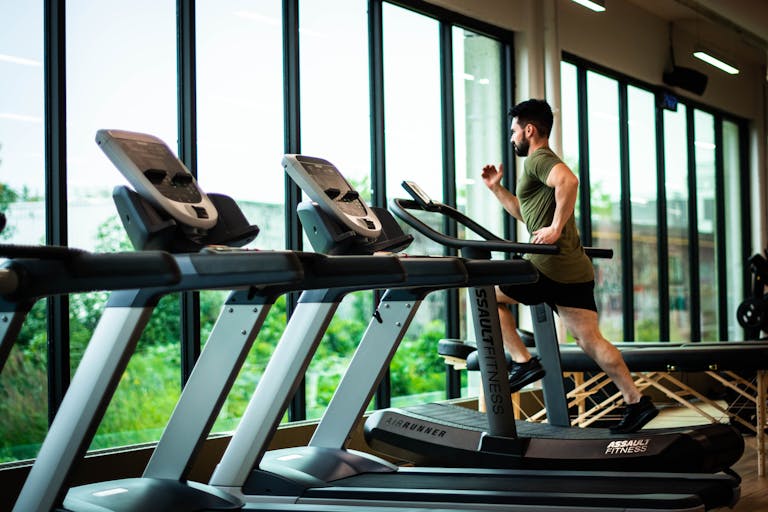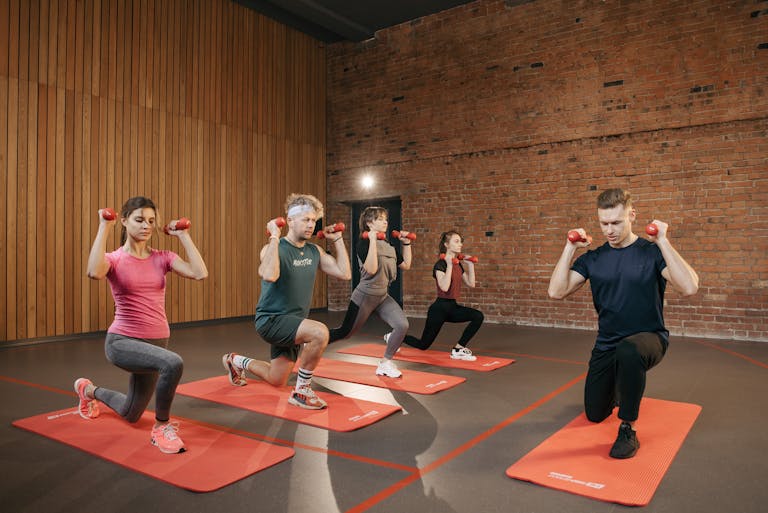Athletic performance has always been measured by visible markers: muscle definition, speed times, and weight lifted. While physicality is essential, elite athletes and fitness enthusiasts are discovering that mental strength may be the most powerful tool in their toolbox. Mental strength is developed through consistent training, experience, and exposure to challenging situations.
The shift towards prioritising mental fitness reflects a growing understanding that the mind controls the body. Athletes face constant pressure – from competition stress to training fatigue – and those who master their mental game consistently outperform their physically stronger counterparts. Mental resilience helps athletes push through barriers, recover from setbacks, and perform at their best when it matters most, leading to better training and competition results.
This guide explores how mindset training improves athletic performance. You’ll learn practical strategies for building mental resilience, understand the science behind the mind-body connection, and discover how to integrate mental strength training into your fitness routine.
Mental strength affects athletic performance, overall well-being, stress management, and overcoming adversity. Whether you’re a competitive athlete or someone chasing personal fitness goals, developing mental toughness will improve your performance beyond what physical training alone can achieve.
What is Mental Strength
Mental strength, also known as psychological resilience, is the foundation that allows individuals to navigate life’s ups and downs with grace and determination. It’s not about never experiencing stress or negative emotions, but about developing the ability to cope with adversity positively. For athletes and non-athletes alike, mental strength means being able to bounce back from setbacks, manage stress effectively, and maintain overall well-being when faced with challenges.
Building mental strength involves practicing mindfulness, self-compassion, and self-care regularly. These practices help individuals recognise and manage negative emotions, thoughts, and behaviours rather than letting them take control. By developing a resilient mindset, you can respond to stress and adversity with greater confidence and adaptability and perform better in sports and everyday life. Remember, mental strength is not the absence of mental illness but the ongoing process of learning to cope, adapt, and grow stronger through life’s challenges.
Why Mental Strength is Important for Athletes
Mental strength is the psychological ability to stay focused, confident, and in control under pressure. For athletes, this means staying calm during competition, pushing through physical discomfort, and bouncing back from failure, setbacks, or injuries. Research shows mental resilience separates good athletes from great ones. A study in the Journal of Applied Sport Psychology found that athletes with higher mental toughness scores performed more consistently and recovered faster from setbacks. Mental strength allows athletes to access their full physical potential when it matters most.
The mind-body connection works through several mechanisms. Mental training helps athletes regulate stress hormones like cortisol, which can impair performance and recovery. It also improves focus and attention, so technique execution and decision-making during high-pressure situations. Mental training shapes behaviour and encourages the development of positive habits that support long-term success. Athletes who develop mental resilience feel more in control of their performance and response to external circumstances.
Mental Health
Mental health is a cornerstone of overall well-being and directly affects how we handle stress, build resilience, and live life. When mental health is neglected, it can lead to increased stress, anxiety, and depression, which can impact relationships, productivity, and even physical health. Prioritising mental health leads to higher self-esteem, better coping skills, and a greater sense of balance and satisfaction in daily life.
Seeking support from a mental health professional when needed is a sign of strength, not weakness. These experts can help you develop the skills and strategies to manage stress, build resilience, and maintain good mental health. Investing in your mental health improves your ability to cope with life’s challenges and enhances your physical health, performance, and overall quality of life. Remember, caring for your mind is as important as caring for your body.
Benefits of Mindset Training in Fitness
Improved Focus and Concentration
Mindset training gives athletes the tools to tune out distractions and stay focused, so they can be fully present during workouts, practices, or high-pressure competitions. This increased ability to concentrate improves performance and ensures athletes execute their strategies and skills precisely, even in the most challenging situations.
Better Stress Management
Stress is inevitable in athletic performance, but mindset training helps athletes build mental resilience to handle pressure gracefully. By learning techniques like mindfulness, visualization, deep breathing, and breathing exercises, athletes can stay calm and composed even in adversity and stressful situations. This ability to manage stress allows them to perform at their best under pressure. Athletes who master these techniques experience less stress overall.
More Motivation
Mindset training creates a growth mindset, where athletes view challenges and setbacks as opportunities for growth, not obstacles. Setting high expectations for oneself can fuel motivation and commitment to long-term goals. This shift in perspective keeps them motivated to push through tough moments, stay disciplined in their routines, and commit to their long-term goals. It also gives them a sense of purpose and helps them stay driven even when progress feels slow.
Faster Recovery from Setbacks
Injuries, losses, and failures can be demoralising and often cause emotional and physical pain, but athletes with strong mental toughness can recover quickly and stay positive.
Mindset training helps them reframe setbacks as temporary obstacles, teaches them to focus on what they can control, and keeps them moving forward. Resilient athletes actively find solutions to overcome barriers and keep progressing. This resilience ensures they stay determined and focused on their journey even when things are unplanned.
Better Team Dynamics
Mindset training benefits individual athletes and team dynamics. Individual athletes’ mental skills can impact the team environment and performance by shaping communication patterns, group cohesion, and collective resilience. Athletes with strong mental skills communicate more effectively, resolve conflicts constructively, and create a positive team environment. Developing empathy and emotional intelligence strengthens collaboration and creates a high-performing team culture.
Self-Compassion for Athletes
Self-compassion is a powerful tool for athletes seeking mental strength and resilience. It means being kind and understanding towards yourself, especially when you face setbacks, make mistakes, or fall short of your expectations. Rather than overly critical, self-compassion encourages athletes to acknowledge their imperfections and respond to challenges with patience and care.
Athletes who practice self-compassion have higher self-esteem and more effective coping strategies, which help them manage stress and anxiety during tough times. This positive approach supports emotional well-being and leads to better performance and a greater sense of fulfillment. By embracing self-compassion, athletes can build resilience, recover faster from disappointments, and maintain a healthy, balanced perspective—on and off the field.
Self-Care for Athletes
For athletes, self-care is more than a luxury—it’s essential for physical and mental well-being. Engaging in self-care practices such as regular physical activity, meditation, and spending quality time with loved ones reduces stress, builds resilience, and supports overall health. Prioritising self-care allows athletes to recharge, manage anxiety, and handle competition with a more positive mindset.
Incorporating self-care into your daily routine can improve mood, performance, and sense of well-being. It also develops a growth mindset and helps athletes overcome challenges and achieve long-term success. By making self-care non-negotiable in your daily life, you’re investing in your long-term health, resilience, and ability to thrive in adversity.
Strategies to Build Mental Resilience for Fitness
Set Clear Goals
Effective goal setting provides direction and motivation for physical and mental training. SMART goals—specific, Measurable, Achievable, Relevant, and Time–bound—create clear benchmarks for progress and help people stay focused during tough times.
Break larger goals into smaller, manageable steps. This prevents overwhelm and provides regular opportunities for success and positive reinforcement. Each small win builds confidence and momentum towards bigger goals.
Positive Mindset
Positive thinking techniques help athletes reframe challenges as opportunities for growth. Affirmations reinforce confidence and self-belief, and visualization creates mental blueprints for successful performance. These are key to building self-confidence, resilience, and mental strength in adversity.
Practice reframing negative thoughts into neutral or positive ones. Instead of “I’m too tired to finish this workout,” try “This is hard, and I’m building mental and physical strength.” This shift in perspective helps you stay motivated and focused even when conditions are tough.
Mindfulness and Meditation
Mindfulness training increases present moment awareness and emotional regulation. Regular meditation practice helps athletes develop the ability to observe their thoughts and feelings without being overwhelmed.
Simple breathing exercises can be done immediately. Try the 4-7-8 technique: inhale for 4 counts, hold for 7, and exhale for 8. This activates the parasympathetic nervous system, reduces stress, and improves focus.
Meditation apps like Headspace or Calm offer guided sessions for athletes. Even 10 minutes daily can greatly affect mental clarity and emotional stability. Yoga, including virtual yoga classes, can also be incorporated as a mindfulness practice to build mental resilience.
Build Mental Toughness Through Challenges
Stress inoculation training involves intentionally exposing yourself to controlled stressors to build mental resilience. Facing these stressors can trigger intense emotions, including anger, and learning to regulate those emotions is key to building mental toughness. This might include varying your workout routine, training in uncomfortable conditions, or practicing under simulated competition pressure.
Cold exposure, such as cold showers or ice baths, is excellent mental toughness training. The discomfort teaches athletes to stay calm and focused under physical stress, skills directly related to athletic performance.
Endurance challenges also build mental grit. Pushing through fatigue during long training sessions develops the mental strength to keep going when your body wants to quit. Resilient people use these experiences to get stronger and more adaptable.
Daily Routine for Success
A daily routine is a powerful way to build mental strength and set yourself up for success in all areas of life. A structured routine that includes meditation, exercise, and journaling helps you manage stress, build resilience, and stay positive. By prioritising self-care and carving out time for relaxation and reflection, you create a foundation for well-being and personal growth.
A daily routine reduces anxiety and stress and gives your life more purpose and direction. It helps you develop healthy habits, stay focused on your goals, and build the strength to overcome challenges. Whether you’re an athlete or just looking to succeed in your everyday life, a consistent routine can help you achieve your goals, maintain your well-being, and build resilience for whatever life throws your way.
Mindset in Everyday Life
Mindset plays a big role in navigating challenges, big or small. For example, a student preparing for a big exam. Instead of giving in to stress, they adopt a growth mindset and view the exam as an opportunity to learn and improve. Recognising how you feel—anxiety or self-doubt—is part of building resilience as it allows you to address emotions constructively. Students build confidence and perform better by staying organized, practicing mindfulness, and focusing on progress.
Think of a professional facing a high-pressure presentation at work. They manage their nerves and deliver an excellent presentation using techniques like deep breathing, visualization, and positive self-talk. Mindset and resilience are also crucial for children. Experiences as children, including positive support or adverse events like childhood trauma, can shape resilience and have a lasting impact on their lives as adults. Building resilience in children helps them adapt to challenges, supports emotional development, and can reduce the long-term effects of childhood trauma.
Mindset Training and Physical Fitness
Mental strength and physical fitness create a powerful feedback loop. Both are developed through consistent practice and training. Strong mental practices lead to more consistent training, better technique, and improved recovery. Physical fitness, in turn, supports mental resilience by building confidence and reducing stress.
Consistency in workouts comes from mental discipline and habit formation. Athletes who develop strong mental frameworks find it easier to stick to training schedules despite low motivation. This consistency leads to better physical outcomes and reinforces positive mental states.
Recovery practices also show the mind-body connection. Athletes who approach recovery with the same mental discipline they apply to training often see faster adaptation and reduced injury risk.
Actionable Tips for Mental Strength Training
Mental preparation is just as necessary as physical readiness for training. Building habits that strengthen your focus, motivation, and emotional resilience can elevate your workouts and get you better results. Here are some simple but powerful mental strategies to add to your training routine:
- Start each workout with a brief mental prep. Set specific intentions, visualise key movements, and take deep breaths to center yourself.
- Keep a training journal that tracks both physical progress and mental notes. Record your mindset, challenges you overcame, and strategies that worked.
- Practice gratitude by noting three things you liked about each session. This will build positive associations and long-term motivation.
- Use mental cues or mantras like “strong and steady” or “I’ve got this” to stay focused during tough moments.
- Apply the 90-second rule for emotional regulation. When frustration hits, remind yourself that intense emotions peak within 90 seconds. Breathe through it to regain control.
- Break bigger goals into smaller, achievable milestones to stay motivated and track progress without feeling overwhelmed.
- End each workout by reflecting on what went well and one area for improvement so that you can continually grow mentally and physically.
Mental Training for Performance
Mental strength training is a game-changer in athletic development. By realising that the mind controls the body, athletes can unlock performance that physical training can’t. These strategies—goal setting, positive mindset development, mindfulness, and stress inoculation—give you a complete framework for building mental resilience.
The benefits go way beyond athletic performance. Mental strength skills transfer to professional challenges, personal relationships, and life obstacles. Athletes who invest in mindset training often report increased confidence, better stress management, and overall life satisfaction.
Start with these mental training techniques gradually. Choose one or two that resonate with you and practice them for several weeks before adding more. Remember that mental strength, like physical fitness, develops through regular practice and progressive challenge.
Ready to improve your performance? Check out our fitness blogs and join thousands of athletes who have discovered that true strength starts in the mind.
Medical Disclaimer:
This content is for informational purposes only and is not intended as medical advice, diagnosis, or treatment. Always consult with a qualified healthcare professional before making any changes to your diet, exercise, or health routine. Never disregard professional medical advice or delay seeking it because of something you have read on this site.





